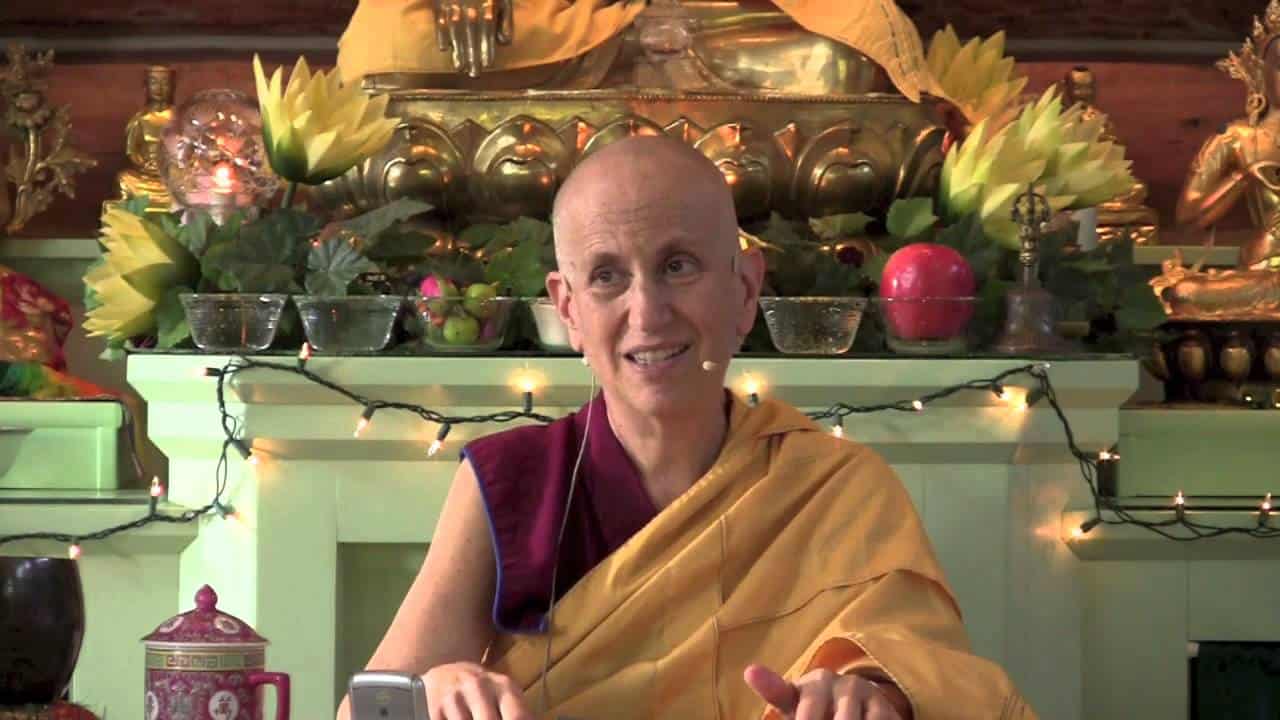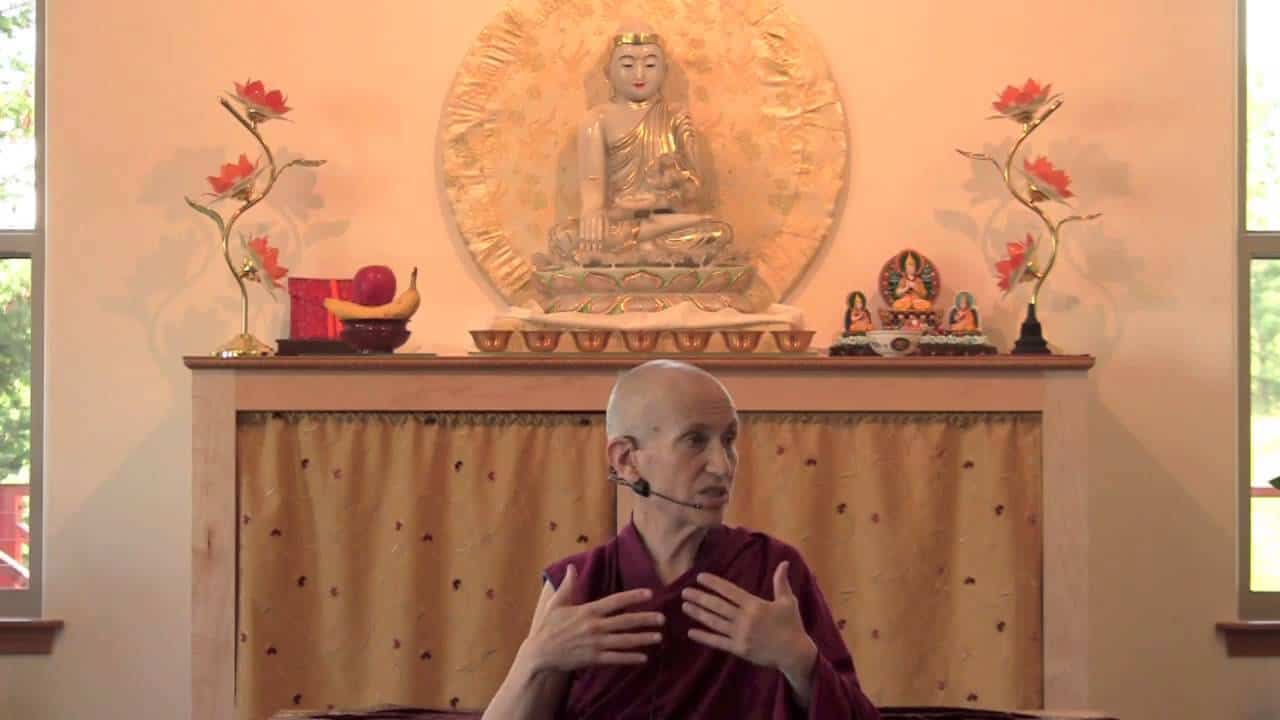Optimism and renunciation
Optimism and renunciation
- A talk in response to “The power of optimism“
- Facing difficulties with optimism
- How optimism is not counter to generating renunciation
- Being optimistic implies a certain understanding and acceptance of the nature of samsara
Optimism and renunciation (download)
We got a question from one of the SAFE [Sravasti Abbey Friends Education] participants. She said that she had watched the video I gave a little while ago called “The Power of Optimism,” and she’s enrolled in SAFE class number two where the topic is renunciation, developing the determination to be free from samsara. So she said that she’s faced a lot of difficulties in her life, some of them have been life-threatening, but she’s always had a very positive attitude through them and has been very grateful for the help that she’s received from other people when she’s had these various problems–some have been medical problems, some haven’t. She’s very glad that she’s had this optimistic way of thinking and seen that having that positive attitude has a good effect on your mind, it helps your body heal faster, you have better relationships with other people, and so on.
But her question is, in studying about the disadvantages of samsara, she says,
It now almost seems as if this optimism is at odds with the methods we are being taught to cultivate renunciation. I know my optimism is different from attachment to life’s pleasure. [It sure is, it’s very different.] But I still feel some confusion when considering this in the context of the teachings about the disadvantages of cyclic existence.
And then she asked if I could talk about this is in a Bodhisattva’s Breakfast Corner.
The thing is, when we have an optimistic attitude about things going on in our lives that’s completely a realistic attitude because we’re just approaching things with a mind that says, “What can I learn, how can I benefit, how can I receive, how can I connect with other people?” It’s a very realistic and beneficial attitude, and everybody’s lives would be much better if they had an optimistic attitude instead of always presupposing the worst.
When we talk about the disadvantages of cyclic existence that, too, is a realistic attitude. We’re not being pessimistic. We’re just seeing what cyclic existence is, and what it isn’t. Okay? We sure are cultivating a certain disillusionment with cyclic existence, but that disillusionment is counteracting the mind that says, “I’m going to find ultimate pleasure and delight and happiness and bliss in cyclic existence.” And that’s a realistic attitude because that’s never going to happen. So we’re just seeing cyclic existence for what it is so that we can deal with it in a practical way, which is to cultivate the wish and the determination to get out of it and to overcome it.
That doesn’t mean we approach life in a pessimistic way, always assuming that the worst is going to happen because that pessimism (is) an unrealistic attitude because that’s jumping to conclusions.
Optimism is something that’s beneficial, it has realism in it. But being optimistic doesn’t mean that we think we’re going to find everlasting bliss and joy in samsara, because that’s never going to happen. So we become optimistic about attaining liberation, about generating bodhicitta, about attaining full awakening, because that is a good state, a state of lasting happiness that we can actually attain, and that we can go towards.
Is it clear developing the renunciation of samsara is realistic? We’re not staying in “samsara stinks” mentality, but we’re cultivating the optimism that will take us to developing our good qualities and giving up our afflictions and attaining full awakening. But meanwhile, while we’re in samsara, on a day to day basis, we try and have a positive attitude and an optimistic attitude, which is also beneficial and realistic.
[In response to audience] Yes, so the optimism that we have the potential to get out of cyclic existence is included in renunciation. And it’s very important—perhaps in SAFE course 2 we need to add some more about this, about buddha nature, about the last two noble truths. Because it isn’t just about the first two noble truths. The last two noble truths, I think, come in a future SAFE course, but maybe we need to remind people also of that when they’re going in depth about the first two truths.
[In response to audience] Yes, and read the letter that introduces the course, because it talks about this there.
Venerable Thubten Chonyi: So for me the letter and the talking about the optimism implies, actually, an acceptance of, understanding the nature of cyclic existence, rather than a denial. So that to experience our difficulties and then have optimism around our capacity to be able to change or appreciating the kindness of the people around us means that implicitly you’ve already accepted this is the way it is, as opposed to pushing it away. And that’s what, it seems to me….. It’s really helpful then in being able to generate the determination to be free we have to accept what it is and have a positive attitude about how we go forward.
Venerable Thubten Chodron
Venerable Chodron emphasizes the practical application of Buddha’s teachings in our daily lives and is especially skilled at explaining them in ways easily understood and practiced by Westerners. She is well known for her warm, humorous, and lucid teachings. She was ordained as a Buddhist nun in 1977 by Kyabje Ling Rinpoche in Dharamsala, India, and in 1986 she received bhikshuni (full) ordination in Taiwan. Read her full bio.


